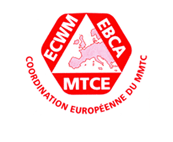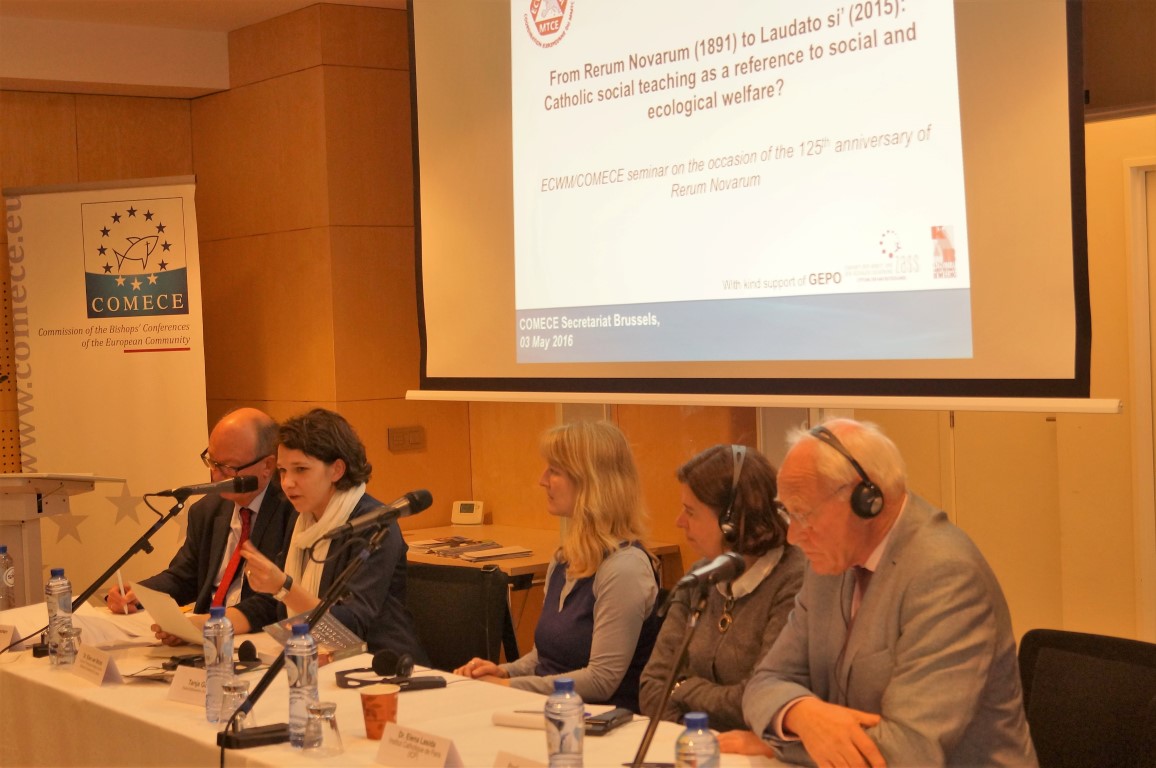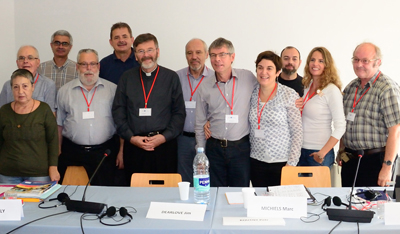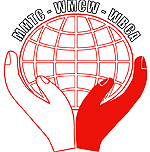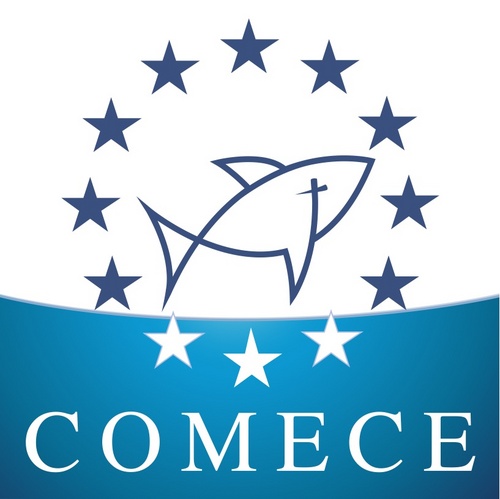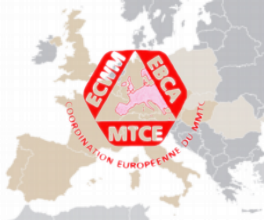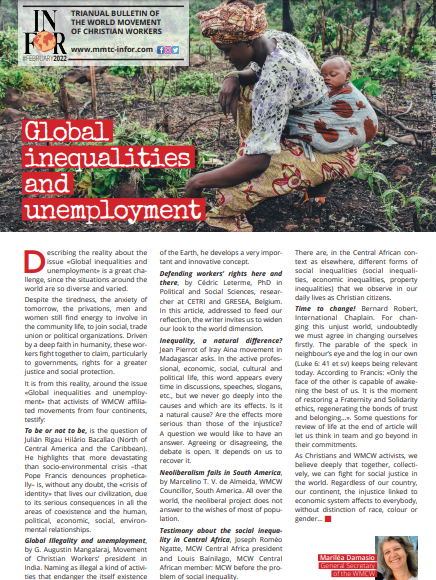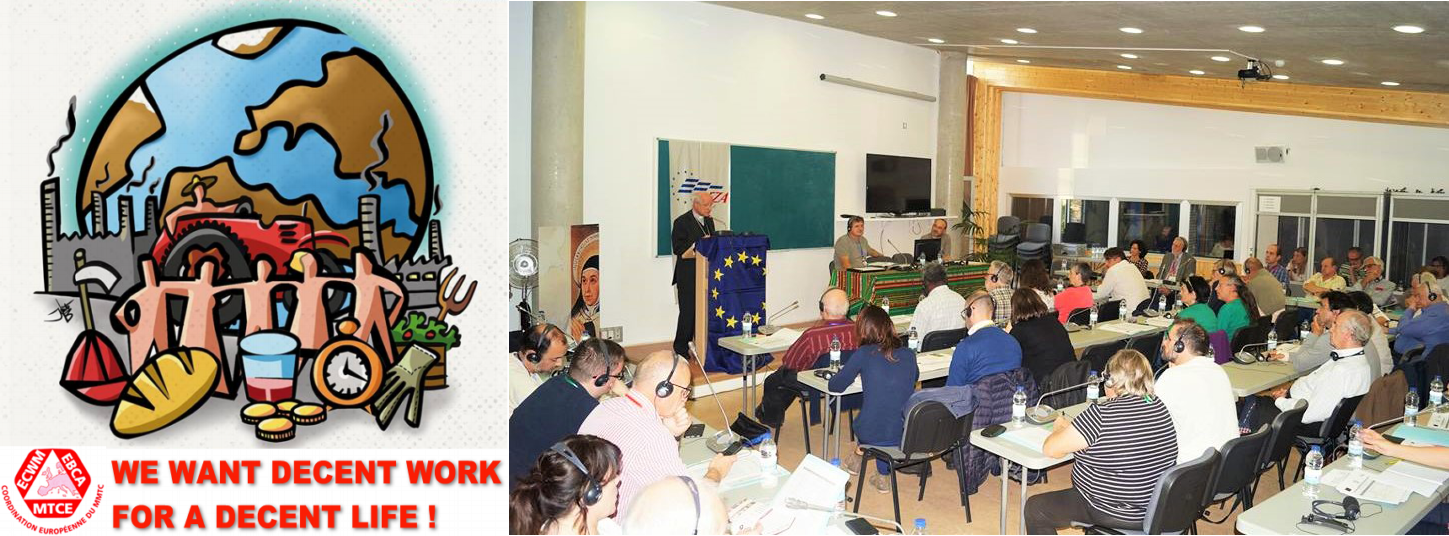
(Outcome of the ECWM seminar on "Decent Work and Precarious Employment" held from 12 to 15 July 2017 in Avila, Spain)
We find that:
Many people around the world are living in unworthy conditions because their basic needs are not guaranteed. They have no access to land, work and housing, which prevents them from enjoying a good life. The globalization of the economy has not had as a consequence a globalization of social rights. The power of multinational corporations in many ways makes it impossible to implement policies that are more respectful of the convictions of the people. Capitalism often drives forward a type of economic progress that does not involve social and environmental accountability. Work is gradually being replaced by precarious employment which, on the one hand, affects people’s health and, on the other, pushes them away and out of society. People are not given the same opportunities in life. Poverty and hunger continue to increase. Many are forced to leave their homeland, because of war and destruction or of poverty. The fate of refugees and migrants shows how unfair the current global economic order is. "This economy kills!" said Pope Francis in his apostolic letter Evangelii Gaudium.
- Details
.png)
Sixty participants from 11 European countries meet from 12th to 15th July at the CITES (Teresian-Sanjuanist International Centre) of the diocese of Avila to hold the annual seminar and General Congress of the European Christian Worker Movement (ECWM).
The seminar, which is being held for the second consecutive year in the city of Avila, focuses its contents, on this occasion, in the European situation regarding decent work and the alarming increase in precariousness throughout the continent.
The first part of the seminar will focus on analysing from personal experiences the consequences of the changes taking place in the labour world. KWB Belgium activists and members of the HKD Napredak organisation in Bosnia will also be present. There will also be a space for reflection and debate on the situation of migrants and refugees in the face of the desperate situation facing so many people and the almost absolute stagnation of European institutions. This moment will be accompanied by Alberto Plaza, Jesuit, director of Pueblos Unidos and member of the Jesuit Service to migrants in Spain.
A second part will address the role of the ILO and workers' organisations in achieving decent work. Bernard Thibault, who was secretary general of the CGT between 1999 and 2013, will participate. He is now a member of the ILO board of directors of France.
The priest Gerard Müller, ECWM accompanier, will consider a look at the labour world from the Word of God and the social doctrine of the Church. After this intervention the work groups will be started to deepen the situation addressed in the expositions.
On Friday the 14th, the participants of the seminar will visit two decent work experiences in Avila. They will know about the work carried out by Diocesan Caritas in supporting the creation of small businesses and the Special Employment Centre for people with disabilities, La Casa Grande de Martiherrero. At the end of these visits a street action is planned and participants, despite linguistic limitations, will approach the citizens of Avila to get their opinion on decent work.
At the end of the seminar the ECWM Congress will begin and will focus its work on the preparation of the General Congress of the World Movement of Christian Workers (WMCW) to be held in the days following the European meeting.
For further information, please contact Manolo Copé, ECWM coordinator, at +34650574823.

Delegates of Popular Movements from all over the world began the discussions for an action plan that is going to be presented to Pope Francis.
200 delegates from organizations of different parts of the world attended to the opening panel of the Third World Meeting of Popular Movements.
Members of Organizing Committee of WMPM welcomed all the asistants and explained the objectives of the Meeting: Cardinal Peter Turkson of PCJP; João Pedro Stédile, from Movimiento de los Trabajadores Sin Tierra (MST) – La Vía Campesina (Brasil); Juan Grabois, from Movimiento de Trabajadores Excluidos (MTE) – Confederación de Trabajadores de la Economía Popular (CTEP) (Argentina); Jockin Arputham, from National Slum Dwellers Federation of India – Slum Dwellers International (SDI) (India) and Charo Castelló, Hermandad Obrera de Acción Católico (HOAC) – Movimiento Mundial de Trabajadores Cristianos (MMTC) (España).
During the interventions the organizing committee remarked the principal subjects of the debate; Land, Housing and Work, including panels about Peoples and Democracy; Territory and Nature; and the situation of refugees. All these realities and worries are going to be analyzed, discussed and synthetized in an action plan that is going to be handed to Pope Francis November 5th.
Cardenal Turkson reminded the words of Holy Father in the Laudato sí, focalizing in the social exclusion determinated by two factors: social and environment, reflected as the two sides of a coin. “In this Meeting we have invited you to discuss how we can change things, it’s not only about being agents of change to the outside, but being agents of change to the inside”. He add “We’re not work searchers, we are work makers and when we talk about work, housing, land and democracy the starting point is real people and their real problems. Beyond statistics it’s about concrete people”. Therefore Cardinal Tursk insisted “we’re going to discuss wich are the changes we need, and Church as Popular Movements will work together to promote the deepest changes our society needs”.
- Details
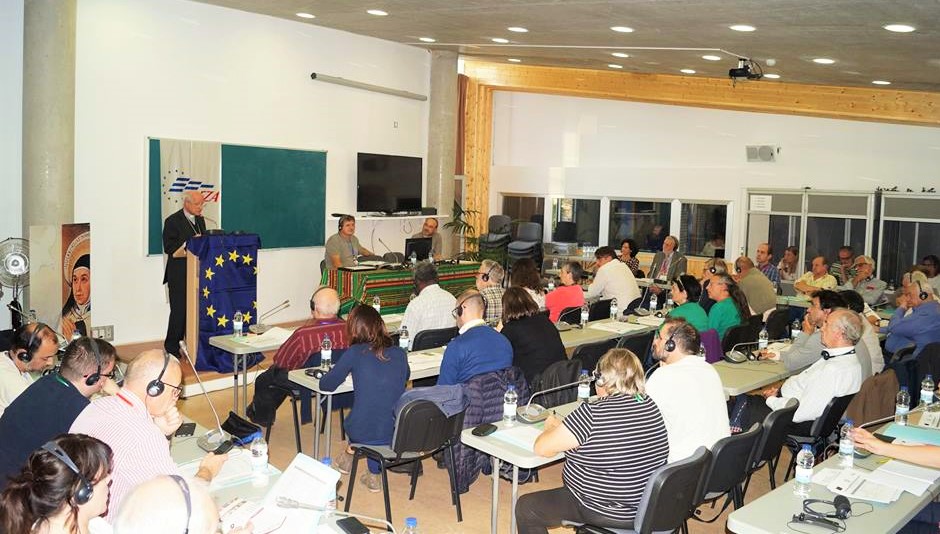
Final declaration of the Seminar of the European Christian Workers Movement
We, movements of Christian workers from all over Europe, met in Avila from October 27th to October 30th, 2016 to learn about and evaluate the changes which are taking place in the world of work. On the basis of the personal experience and testimonies of the groups affected by these changes, the participants to the seminar analyzed the causes and consequences of these changes on young people and families.
The Seminar also reviewed the Report of Caritas Europe on poverty in Europe and discussed the prospects for the world of work from the perspective of the social Doctrine of the Church. This was done by evaluating the work done by both Church and trade union organisations in order to cope with the consequences on people of the current world of work. Finally, the movements also reflected about the challenges that both Church and society are facing as a consequence of the current changes in the world of work.
Challenges related to decent work
Benedict XVI reminds us, in Caritas in veritate, that decent work is “the expression of the essential dignity of all men and women” (N. 63). Consequently, if work is not decent, workers will not be able to have a dignified life. The increasingly precarious work conditions are one of the most devastating consequences for people, families and society. In his speech to the European Parliament in November 2014, Pope Francis affirmed that it “was especially necessary to regive dignity to work and also guarantee that the right conditions are in place to ensure that this is achieved”.
We will find answers to the current situation of the world of work only if we find ways and means to reaffirm the dignity of work. To do so, it is essential to deeply rethink the meaning we give to work.
We are facing many challenges: positioning the person at the center of everything, giving work a meaning and a value that goes beyond employment, ensuring dignified condition of work, that contribute to humanizing work, ensuring universal access to health, housing, education, etc without conditioning these rights to having a paid job. We are also facing a transformation of the world of work because of the increased robotization and computerization
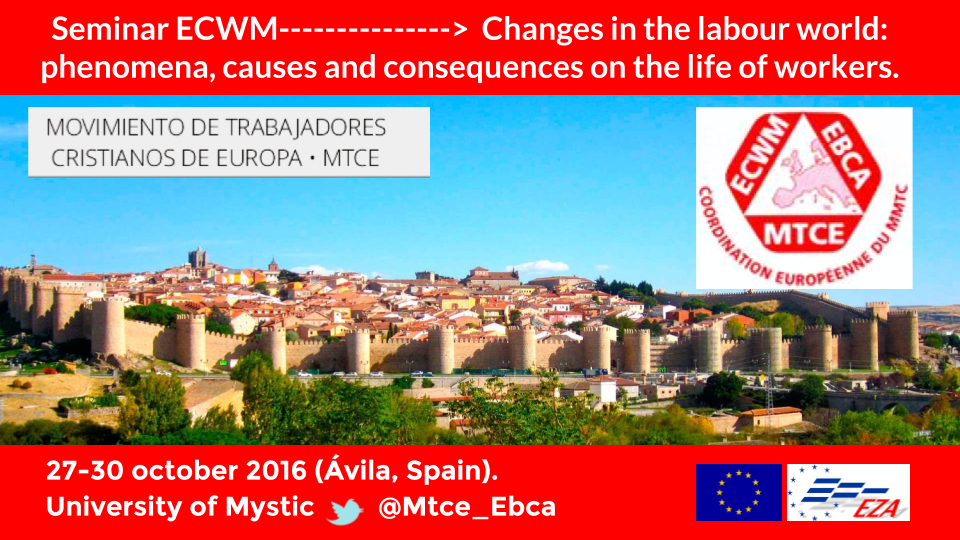
CHANGES IN THE WORLD OF WORK.
Causes and consequences for the lives of workers.
From 27th to 30th October, the annual conference and general assembly of the European Movement of Christian Workers (ECWM) will be held at the CITES (International Teresian Centre) of the diocese of Avila.
The seminar focuses its contents on the changes in the world of work, the causes and consequences of these changes in the lives of working families.
The opening session will be attended by the Bishop of the diocese of Avila, Mons. Jesús García Burillo, the mayor of the city, José Luis Rivas and the vicepresident of EZA (European Centre for Workers' Questions) Herbert Metzger. Also will be Manuel Candil, president of HOAC Ávia and Jose Fernando Almazán, president of HOAC Spain.
The first part of the seminar will focus on analyzing from personal experiences, the consequences it is having the changes that are occurring in the workplace. Speakers will be young militants of the JOC of Avila and also members of the PAHs of Avila.
A second part, in the morning, will address the contents of the report of Caritas Europe "Ending poverty in Europe. Our proposals to make this possible. To deepen the content of this report will accompany us Pedro Fuentes, a sociologist and member of Team studies Caritas Spain. Also we have the presence of Thomas Wallimann, Director of the Social Institute of Switzerland, the movement of Christian workers in Switzerland (KAB) that raise the outlook for the world of work today, from the social doctrine of the Church.
In the afternoon there will be a work in groups to address the causes and consequences of the current situation in the world of work and then there will be two visits to the city: Caritas Ávila to know the employment program of this entity and another visit at the headquarters of workers' comissions to share a round table with trade unions USO, UGT and CCOO.
The third part of the seminar will address the challenges that changes in the world of work and its current orientation presented to the Church and society. The content of this part will develop Montxo López, a militant of HOAC Bilbao and member of the working Pastoral of the Diocese of Bilbao.
At the end of the seminar, the Assembly of ECWM focus its work on the preparation of the General Assembly of the World Movement of Christian Workers, MMTC. The meeting will be held next July also in the city of Avila, where they will attend representatives of Christian workers of all parts of the world.
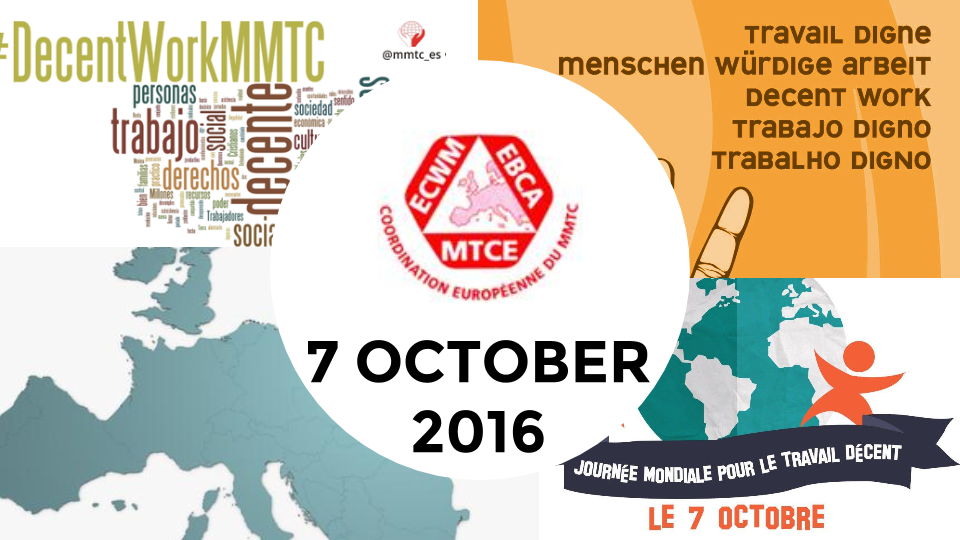
The movements of Christian workers in Europe prepare actions for the World Day for Decent Work (7 October)
http://acocat.org/noticia/
From Rerum Novarum (1891) to Laudato si (2015). Catholic Social Teaching as a reference for social and ecological welfare. This was the title of the seminar organised in Brussels by the European Movement of Christian Workers and COMECE (Commission of the Bishops’ Conferences of the European Community) on 3rd May.
This seminar aimed to make a tour around the social message along these 125 years, since Leo XIII wrote Rerum Novarum, has been given by the various Popes, and the evolution of the social doctrine of the Church up to Laudato Si. The seminar concluded with a round table where different speakers discussed some issues about it. Here youcan find the program (in English).
The seminar continued in the afternoon with a reception in which two European parliamentarians participated. European People's Party: Elmar Brok, and the Party of European Socialists: Patrizia Toia. Joining them Professor Gabriel Ingeborg, vice president of Justice and Peace Europe, shared a memorable talk.
Several bishops accompanied us, but Mons. Gianni Ambrosio, vice president of COMECE and Chairman of its Committee on Social Affairs, and Mr Patrick H. Daly, General Secretary were present during the whole event. In addition to activists of the movements of Christian workers from different countries that are part of this European coordination, we share this seminar with members of various bishops' conferences (Germany, France, Ireland, etc ...), religious organizations that are coordinated at European level: Caritas Europe, European Jesuit, Justice and Peace Europe, Catholic universities (Salamanca, Milan, Leuven, Paris ...) and CEC (Conference of European Churches).
- Details
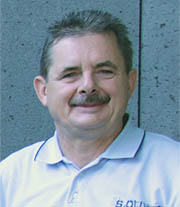
Labor, bread and dignity – The people want and deserve a better Europe.
“Alejandro Riega and Veronica Aversa are visibly very tired but equally happy. They wandered for three weeks, as many of their compatriots, from the extreme north west of Spain to Madrid. ‘Marches for dignity’, that’s how they named the ongoing protest against the austerity policies of the conservative Prime Minister, Marriano Rajoy.” (from Badische Zeitung, 24 March 2014)
Youth unemployment has reached dramatic proportions, especially in these countries which are extremely affected by the crisis, a crisis that increases and intensifies the social division in Europe. The social gap and inequality in member states and in Europe is growing rapidly. It is a scandal that the rich get richer as profiteers of the crises while the number of poor people is increasing.
Our belief is clear: if we want to give globalization a human appearance, we must ensure that Europe proves itself as a model of social equality for all. This Europe of the future must be a new, a different Europe, a Europe which implements the concept of a European social model in actions. For the realization of the social integration of Europe, ECWM gives priority to employment prior to the capital. (encyclical letter Laborem exercens)

On May 3rd, 2016, the European Movement of Christian Workers (ECWM) and the Commission of Bishop Conferences of the European Community (COMECE) will hold a joint seminar at COMECE headquarters in Brussels on the occasion of the 125th Anniversary of Rerum Novarum. The theme of the seminar will be "From Rerum Novarum (1891) to Laudato si (2015). Catholic social teaching as a reference to social and ecological welfare.
E-mail This email address is being protected from spambots. You need JavaScript enabled to view it..for more information.
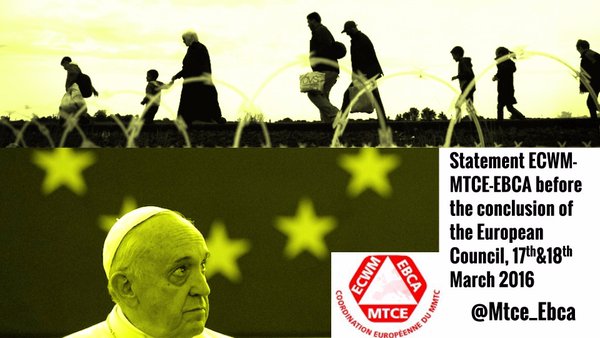 The ECWM co-ordinates 20 organisations from 15 countries of the European Union (EU) and Switzerland. It totally rejects the draft agreement reached between the EU and Turkey on refugees. This agreement is a serious step backwards for human rights.
The ECWM co-ordinates 20 organisations from 15 countries of the European Union (EU) and Switzerland. It totally rejects the draft agreement reached between the EU and Turkey on refugees. This agreement is a serious step backwards for human rights.
The countries of the EU cannot sign an agreement with Turkey which is contrary to International Law. This agreement violates International and European Conventions ratified by Member States which expressly prohibits the return of persons who are subject to persecution or victims of war. We can easily forget that behind the increase in migration there is always the inhumanity of an unjust economic system in which profit prevails over the dignity of the human person and the common good. We cannot build a fortress Europe and refuse to welcome the stranger. The challenge remains to build a Europe of the people as well as an economic system which serves the needs of everyone and in particular the most vulnerable.
The European Council taking place on 17th & 18th March 2016 is crucial and we, the ECWM, are adamant that we do not want a European Union that may violate human rights and International Laws. We must show our representatives that many organisations and individuals do not agree with this draft agreement and we call upon all people of good will to express their rejection of this decision.
This refugee crisis is a challenge for all of Europe. How does the Christian and humanist heritage of the Continent meet this challenge and be true to the words of the Gospel “I was a stranger and you welcomed me”. The ECWM renews our commitment to work for a just and sustainable society in Europe as well as the rest of the world. We are at one with the words of Pope Francis, who declared “It is time to build together a Europe that does not focus entirely on the economy but acknowledges the sacredness of the human person”.
Finally, we remember the words that Jesus Christ left us in His Gospel “Truly, I say to you whenever you did this to these little ones who are my brothers and sisters you did it to me” (Mt 25:40).
- Details
The meeting of the European Christian Workers Movement (ECMW) held in Lisbon from 16th to 19th October, ended with a statement about two issues as hot as the Transatlantic trade between the US and the European Union and the police raid "Mos maiorum”. Similarly, the European coordinator reaffirmed its commitment to the fight against unemployment.
Seminar: Fighting against unemployment
The European Christian Workers Movement (ECMW) shared the current reality of unemployment in many European countries in its annual seminar in Lisbon. The shared reality shows how critical the situation is for many people, but also the small signs of hope that exist in our environments. Despite the current crisis in the employment throughout Europe we believe that there is work for everyone. We recall that the priority of labour over capital (Laborem Exercens). "Money must serve people, not the other". Therefore it is necessary people who have jobs, are aware that the work is something more than employment. But the job created has to be decent to break these dynamics, and besides everyone has the right to a minimum income, independently whether they have employment or not. For reversing this situation, we propose the following actions:
• A joint program in Europe that addresses the creation of jobs. A program which ends the current austerity measures in favour of public spending and investment will lead to millions of new jobs and decent work for everybody. The creation of decent work will contribute to build full rather precarious lives and it will encourage people to contribute to society as a whole.
• We will also continue to promote the World Day for Decent Work on 7th October of each year. Decent work must be at the center of the political agenda of the EU.
Page 3 of 3
latest articles
- Recommendations of the EMCW for the European Elections 2024
- Christmas, a proposal of peace and hope
- Summary from the ECWM seminar from 21-23 September 2023 in Barcelona
- Peace be with you, children of Ukraine and Russia, children of Europe!
- Work Free Sunday - 3rd March
- Christmas Message by the European Christian Workers Movement
- Final Statement of the ECWM Seminar in Lisbon 2022: "Impact of the Coronavirus Pandemic on Employment and Social Affairs - Experiences and Actions for Recovery"
- Europe Day 2022: Statement of European Christian Workers Movement (ECWM)
- May 1st: Covid19 Lockdown And Its Impact On Workers
- 1.701 good reasons to protect Sunday as the day of the rest
On the website of WMCW
World Movement of Christian Workers - Home
18 December 2025
Website of the World Movement of Christian Workers - Site Web du Mouvement Mondial de Travailleurs Chrétiens - Página web del Movimiento Mundial de Trabajadores Cristianos- INFOR June 2025: "Human Dignity, a Daily Struggle"
- INFOR March 2025: "Informal Work in Caring for Children and the Elderly"
- INFOR October 2024: "Our Fight against an Inhuman Policy"
- INFOR July 2024: "Health and Security at Work"
- INFOR April 2024: "Precarity with many faces"
- INFOR Special Issue on the General Assembly - Lourdes 2023
- INFOR October 2022
- INFOR June 2022: Globalization
- Europe Day 2022: Statement of European Christian Workers Movement (ECWM)
